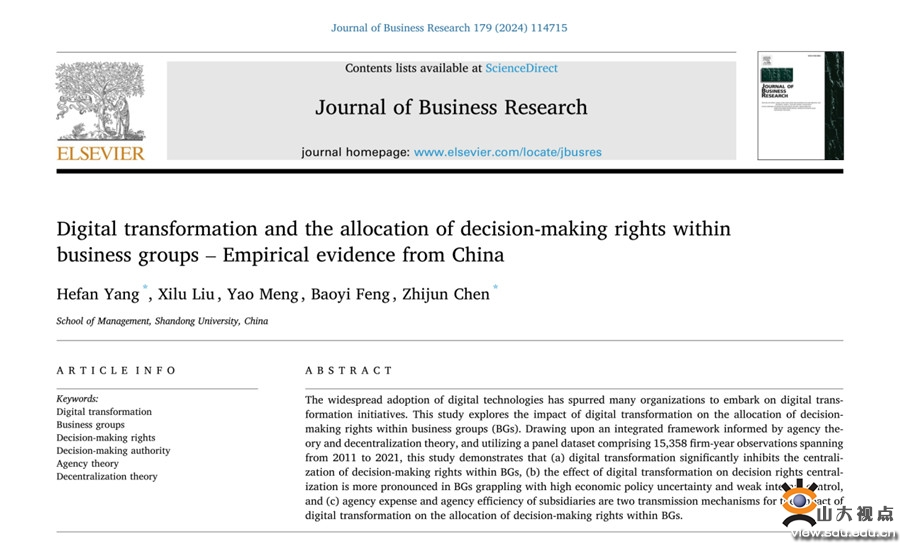Recently, Professor Chen Zhijun, doctoral students Liu Xilu and Feng Baoyi, and postgraduate students Yang Hefan and Meng Yao of the School of Management, Shandong University published their latest research results “Digital Transformation and the Allocation of Decision-making Rights within Business Groups - Empirical Evidence from China”. It was published in the 179th issue of the Journal of Business Research, an international journal of management, which is an SSCI Q1 journal with an impact factor of 11.3. Professor Chen and Yang Hefan are the co-corresponding authors of the paper, Yang Hefan is the first author, Shandong University is the first author affiliation and only corresponding author affiliation, and the research is supported by the National Natural Science Foundation of China.

In recent years, the new technological revolution characterized by the comprehensive and in-depth application of emerging digital technologies has flourished, driving the digital transformation of enterprises. Digital transformation refers to the process by which an enterprise brings significant improvements to an entity by utilizing a combination of information, computing, communication, and connectivity technologies. Although the positive impacts of digital transformation have been widely recognized, existing research has yet to focus on the impacts of digital transformation on the intricate power dynamics within organizations. Especially in the case of business groups, the distribution of decision-making rights is particularly problematic due to the complexity and diversity of the organizational structure. Therefore, the research is dedicated to exploring how digital transformation affects the allocation of decision-making rights within business groups.
The research selects 15,358 firm-year observations from 2,803 firms in China's Shanghai and Shenzhen stock markets from 2011 to 2021 as research samples, and through empirical analysis, the conclusions are as follows: digital transformation significantly inhibits the concentration of decision-making rights within business groups; the effect of digital transformation on the concentration of decision-making rights is more pronounced in business groups facing a high degree of economic policy uncertainty and weak internal controls. In addition, subsidiary agency costs and agency efficiency are two important transmission mechanisms through which digital transformation affects the allocation of decision-making rights within business groups.
The main contributions of the research are reflected in the following three aspects: first, it enriches the research on the consequences of digital transformation. Unlike previous studies that mainly focus on the economic impact of digital transformation on business efficiency and performance, the research provides an in-depth analysis of its impact on the allocation of decision-making rights within the organization, thus deeply revealing the far-reaching significance of digital transformation in driving organizational change. Second, it broadens the perspective of antecedent research on the parent-subsidiary relationship, elucidates the positive significance of digital transformation in optimizing the allocation of decision-making rights, enriches the literature on business groups, and adds value to the field of business group research. Finally, it further explores the association between digital transformation and contextual factors such as economic policy uncertainty and internal control quality, as well as the role of transmission mechanisms such as subsidiary agency cost and agency efficiency in the context, providing more theoretical and empirical support for research in related fields.
Chen Zhijun is a Professor at the School of Management, Shandong University, serving as an invited researcher of the Policy Research Office of the People’s Government of Shandong Province, Vice President of Shandong Management Society, and Editorial Board Member of the Forum on Science and Technology in China. He serves as the host of the national quality course “Strategic Management”, and led more than 10 programs of the National Natural Science Foundation of China and the Humanities and Social Sciences Program of the Ministry of Education. He was awarded the honors of Outstanding Instructor of College Students Innovation and Entrepreneurship in Shandong Province, Baosteel Outstanding Teacher, and Shandong University Outstanding Teacher, Shandong University Outstanding Doctoral Dissertation Supervisor, and Model of Teaching and Educating in Shandong University. He has written many monographs and textbooks, including Enterprise Strategic Management and Enterprise Group Management, which were awarded the First-class Textbook for General Higher Education in Shandong Province in 2020. He has published more than 100 papers in the Journal of Management World, China Industrial Economics, Nankai Business Review, Guangming Daily, etc. There are more than 10 academic papers among which have been reprinted by Renda Periodicals or extracted from the arguments of Xinhua Digest, which makes him one of the authors with the largest number of papers published in the field of domestic group research. The relevant achievements have won the second prize of National Teaching Achievement and the second and third prizes of Shandong Province Social Science Outstanding Achievement Awards. His research areas include enterprise group management, strategic management, and enterprise governance.